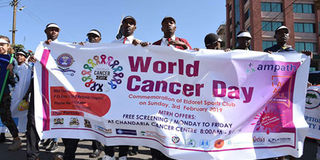We must cast our net wide to beat cancer

Cancer activists propagate awareness on the disease in Eldoret town on February 3, 2019. The prevalence of cancer in the country is worrying. PHOTO | FILE | NATION MEDIA GROUP
What you need to know:
- We must equip our hospitals and ensure that we have more specialists detecting and treating this scourge.
- We must also tap more on the scientists and experts to examine the wellness of the food and drinks we ingest.
The cancer scourge has been in the news over the past couple of months as it continues to ravage the country, with numerous lives lost to the disease.
Reports of cancer deaths may have temporarily disappeared from the headlines for now, but I'm afraid we have a runaway disease that, as a country, demands that we put our heads together if we are to make any headway in tackling this menace.
Personally, I have been through the excruciating motions with a close relative who was taken ill. We did everything we could. She fought hard.
But we lost the battle. I believe very many Kenyans have been through this journey of tears and grief.
The prevalence of cancer in the country is worrying. According to official data, we are losing eight Kenyans every day to cancer. Most of the responses that have been put forward relate to screening and treatment.
NATIONAL POLICY
Without a doubt, we must be aggressive about screening and treatment of cancer. We must equip our hospitals and ensure that we have more specialists detecting and treating this scourge.
The National Cancer Control Strategy 2017-2022 lays out certain preventative measures.
Among the proposed activities in the prevention is the promotion of farming and storage methods that reduce cancer risks such as safe use of chemical fertilisers, herbicides and pesticides.
They also strongly advocate for campaigns promoting healthy diets and physical activity.
We must however dig deeper and address the root cause of this disease that has become an existential threat.
The rising cancer prevalence set me thinking about what could be happening to our food in particular, that could be exacerbating this crisis.
FOOD HANDLING
I was pondering the possibility that there's something wrong with our sources, or handling of food, when a decade-old video emerged, showing startled MPs listening to the then Kenya Bureau of Standards Kioko Mang’eli warning about a looming cancer crisis.
Mr Mang’eli told stunned MPs that maize containing aflatoxin had been allowed into the country by unscrupulous government officials who had bypassed Kenya Bureau Of Standards (Kebs).
This, he said, would lead to an increase in cancer in about a decade. The ominous forecast appears to be coming true today.
High levels of aflatoxin in maize – a staple food – means that the entire country was put at risk by some officials who should ideally be languishing in jail.
Let me illustrate this. If you miss a maize-based meal at home, you’ll come across it as an ingredient in any number of processed foods, including milk, which is an ubiquitous drink for tea-loving Kenyans.
Dairy farmers depend on commercial feeds to supplement what they grow to increase milk yields.
When, therefore, a decision is made that since some maize is unfit for human consumption but can be milled for cow feed, the toxicity is simply transferred straight into the milk.
BROKEN SYSTEM
Such an astonishing decision - of allowing a consignment of toxic maize into the country – could therefore end up affecting even the very loved ones of the very official who signed it in.
The myopia of such corrupt officials is not only mind-boggling; it is openly criminal.
You can see why improving screening and treatment alone will not solve the problem that confronts us, unless we dig deep into the root cause of the problem.
I can say without fear of contradiction that the regulatory system for managing the science around our crop and animal husbandry, and the national food import chain, is broken.
We are losing good ground against cancer away from doctors’ offices, diagnostic machines, hospital wards, and palliative care.
We are losing the battle the moment we can’t keep toxic maize – and who knows what else – from landing on our shores.
EXPERTISE
We lose the battle the moment our small-scale farmers are no longer visited by extension officers who can guide them on the proper application of chemicals for their crops and other processes, like making silage that is free from pollutants.
These might seem like small steps in stemming the spread of cancer, but they just might be what we have been looking for.
What must we do then? I’m of the considered view that our fight against cancer must be multidisciplinary.
As medical researchers and practitioners do their bit, we must also tap more on the scientists and experts to examine the wellness of the food and drinks we ingest.
We must also introduce the necessary policy and regulatory changes for two purposes. First, we should do it to elevate the State agencies charged with these grave responsibilities to national security status.
Secondly, I propose to raise the level of responsibility officials must bear when it comes to matters of life and death. We are under attack and cannot continue business as usual.





